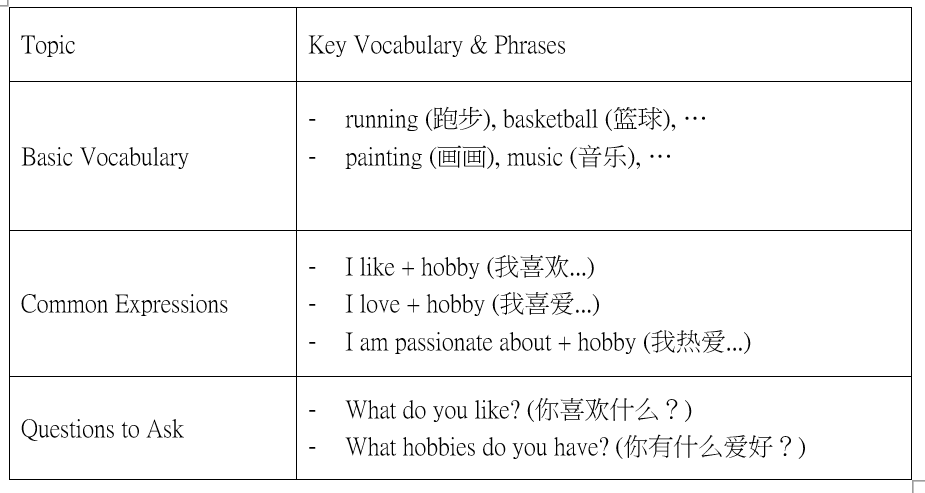Hey there! 🌟 If you’re looking to share your hobbies and interests in Chinese, you’re in the right place! It can feel a bit challenging, but don’t worry—once you learn some key phrases and vocabulary, you’ll be chatting away in no time.
A Quick Gance

Basic Vocabulary
Verbs:
- Likes: (喜欢 – xǐ huan),
- love (喜爱 – xǐ ài)
- passionate about (热爱 – rè ài)
- interested in… (对……感兴趣 – duì…gǎn xìng qù).
Hobby Vocabulary:
- Sports:
- running (跑步 – pǎo bù),
- basketball (篮球 – lán qiú),
- soccer (足球 – zú qiú),
- swimming (游泳 – yóu yǒng).
- Arts and Culture:
- painting (绘画 – huì huà)
- music (音乐 – yīn yuè)
- movies (电影 – diàn yǐng),
- reading (阅读 – yuè dú).
- Crafts and Leisure:
- cooking (烹饪 – pēng rèn),
- traveling (旅行 – lǚ xíng),
- photography (摄影 – shè yǐng),
- chess (下棋 – xià qí).
Common Expressions
1. Expressing Likes
In both Chinese and English, the structure for expressing likes follows the format: Subject + Verb + Object. For example: 我喜欢跑步。(Wǒ xǐhuān pǎobù.)
- Subject: 我 (Wǒ) = I
- Verb: 喜欢 (xǐhuān) = like
- Object: 跑步 (pǎobù) = running
Additional phrases include:
- I like + hobby, e.g., I like running (我喜欢跑步 – Wǒ xǐ huan pǎo bù).
- I love + hobby, e.g., I love music (我喜爱音乐 – Wǒ xǐ ài yīn yuè).
- I am passionate about + hobby, e.g., I am passionate about reading (我热爱阅读 – Wǒ rè ài yuè dú).
2. Expressing Interest
To express your interest in something, use the pattern 我对…感兴趣 (Wǒ duì…gǎn xìngqù), Structure Breakdown:
- 我 (Wǒ) = I
- 对 (duì) = towards/in (indicating interest)
- … (XX) = insert subject or hobby
- 感兴趣 (gǎn xìngqù) = interested
Example: 我对绘画很感兴趣。(Wǒ duì huìhuà hěn gǎn xìngqù.) – “I am very interested in painting.”
Inquiring About Others' Hobbies
1. 你喜欢什么? – Nǐ xǐ huan shén me?
‘你喜欢什么?’menas’What do you like?’ Let’s break down the sentence:
- 你 (Nǐ) = you
- 喜欢 (xǐhuān) = like
- 什么 (shénme) = what
In Chinese, 什么 (shénme) is used as a question indicator similar to “what” in English, and it typically appears at the end of the sentence. A common structure is Subject + Verb + 什么 (shénme).
2. 你有什么爱好? – Nǐ yǒu shén me ài hào?
“你有什么爱好?” means “What hobbies do you have?” Let’s break down the sentence:
- 你 (Nǐ) = you
- 有 (yǒu) = have
- 喜欢 (xǐhuān) = like
- 什么 (shénme) = what
- 爱好 (ài hào) = hobbies